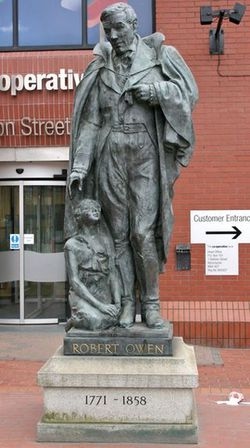Robert Owen (1771-1858), social and educational reformer, remains a controversial and enigmatic figure. Having profited enormously from enterprise in the early Industrial Revolution he set about trying to remedy its excesses through environmental, educational, factory and poor law reform. Synthesizing reformist ideas from the Age of Enlightenment and drawing on his own experience as an industrialist he constructed A New View of Society (1816), a rallying call for widespread social change, with education at its core. New Lanark, the test-bed for his ideas, became internationally famous.

Robert Owen moved on to the world stage, using New Lanark, however inappropriate, as a model for his Village Scheme, where rather than profit mutual co-operation would be the prevailing ethos. Owen later translated his ideas to the United States, attempting to establish a Community of Equality at New Harmony (1824-28) in Indiana. This was followed by a fantastic and abortive scheme to colonise part of the new Mexican republic on communitarian principles.
Robert Owen returned to Britain, continuing his propaganda campaign, by promoting labour exchanges, consumer co-operatives, trade unions and other Owenite organisations. By the 1830s the man had become a movement headed by Owen as Social Father. Always education, for what Robert Owen was by then calling the New Moral World, was central to his thinking.
Robert Owen (1771-1858)
Robert Owen was a man ahead of his time. During his lifetime, he endeavoured to improve the health, education, well-being and rights of the working class.This driving ambition to create a better society for all took him around the world, from a small mill village in Lanarkshire in Scotland to New Harmony, Indiana in America with varied success. Although, he encountered much criticism and opposition in his lifetime, he influenced reformers who came after him and many of his views are as relevant and resonate today in their modernity and progressive.
Origins
Born on the 14th May 1771, in Newtown, a small market town in Wales, Robert was the sixth of seven children born to the local saddler and ironmonger. He was an intelligent boy who read avidly, loved music and was good at sports. He began his career in the textile industry early on, from around the age of 10. By the time he was 21 he was a mill manager in Manchester. His entrepreneurial spirit, management skill and progressive moral views were emerging by the early 1790s. In 1793, he was elected as a member of the Manchester Literary and Philosophical Society, where the ideas of reformers and philosophers of the Enlightenment were discussed. He also became a committee member of the Manchester Board of Health which was set up to promote improvements in the health and working conditions of factory workers. Meanwhile, in Scotland, New Lanark Cotton Spinning Mills were being established. This enterprise was to prove pivotal in Owen’s career as a businessman and social pioneer.
A New Society for the New Millennium?
Robert Owen often talked of the new Millennium; a time, he hoped, when society would be greatly improved. When he opened the Institute for the Formation of Character on New Year’s Day 1816, he gave an Address to the Inhabitants of New Lanark, in which he outlined his hopes for the Millennium, his plans, and his notion that education was the means of achieving a better and fairer society.
The Address included these memorable words:
“What ideas individuals may attach to the term “Millennium” I know not; but I know that society may be formed so as to exist without crime, without poverty, with health greatly improved, with little, if any misery, and with intelligence and happiness increased a hundredfold: and no obstacle whatsoever intervenes at this moment except ignorance to prevent such a state of society from becoming universal”.
Working Conditions
Owen’s extremely advanced system of factory management, which he pioneered at the New Lanark Mills gained him credibility, not only as a successful businessman, but also as a benevolent employer. He proved that commercial success could be achieved without exploitation of those employed; his approach to social and economic organisation was extended beyond the mill floor into every aspect of village life.
“The working classes may be injuriously degraded and oppressed in three ways:
>When they are neglected in infancy
>When they are overworked by their employer, and are thus rendered incompetent from ignorance to make a good use of high wages when they can procure them.
>When they are paid low wages for their labour “. (On the employment of children in manufactories, 1818)
“The lowest stage of humanity is experienced when the individual must labour for a small pittance of wages from others”. (From a Paper Dedicated to the Governments of Great Britain, Austria, Russia, France, Prussia and the United States of America, London 1841)
“Eight hours’ daily labour is enough for any human being, and under proper arrangements sufficient to afford an ample supply of food, raiment and shelter, or the necessaries and comforts of life, and for the remainder of his time, every person is entitled to education, recreation and sleep”. (From the Foundation Axioms of Owen’s “Society for Promoting National Regeneration”, 1833)
Women
Robert Owen’s views had particular appeal for women. At a time when men were hostile to women’s rights, he courted controversy by denouncing marriage, as it then existed, as a form of slavery for women.
“Women will be no longer made the slaves of, or dependent upon men…. They will be equal in education, rights, privileges and personal liberty”. (Book of the New Moral World: Sixth Part, 1841)

 Follow
Follow